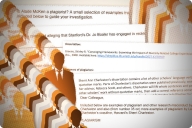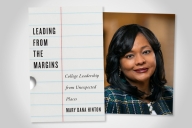You have /5 articles left.
Sign up for a free account or log in.
Edward Burger has long argued that the path to learning is not necessarily a straight line. As a mathematics professor at Williams College, he encouraged students to learn by failing to achieve a task. Now president of Southwestern University, in Texas, Burger continues to argue for nonconventional approaches to learning, alongside (not instead of) the liberal arts.
His new book is Making Up Your Own Mind: Thinking Effectively Through Creative Puzzle-Solving (Princeton University Press), with ideas for academics and nonacademics alike. Via email, he answered questions about the book.
Q: You have written extensively about mathematics and also the need to embrace failure as part of the learning process. How did you get from those topics to puzzle solving? What led to this focus?
A: Over the past decade or so, I've been interested in practices of effective thinking. That effort led to my book The 5 Elements of Effective Thinking, co-authored with Michael Starbird and published by Princeton University Press in 2012. One of those elements is effective failure -- in which a mistake is not left until it offers a new lesson or insight. In my experience in delivering lectures and leading workshops, effective failure … appears to provoke the most thought among students as well as business leaders. But all those elements of effective thinking need to be practiced, so I developed a course at Southwestern that I playfully call the Seinfeld of the curriculum: it's about nothing but tries to teach everything. That is, there is no short-term content, but rather only long-term goals to allow students to hone their own thinking and creative skills. They practice these elements of effective thinking through mind-bending puzzles. The ultimate goal is not to solve the puzzle, but rather to practice effective thinking through the puzzles and then apply those same mind-sets to everything else in the students’ lives.
Q: Your new book starts with a discussion of formal education and academe. How much do you view puzzle solving as something that should be part of that education? Or is the idea more to do this as well as higher education?
A: If education is about lifting up individuals and making them better versions of themselves, then we need to provide learners with ways of thinking as well as opportunities to practice those mind-sets. I do not believe we should be teaching students what to think, but rather how to think more effectively, how to understand more deeply, and how be more creative while making meaningful (and, ideally, original) connections. Many people talk about “problem solving.” In fact, our lives are filled with large and small conundrums. The unpleasant ones are problems, but we need to effectively think through all of life’s issues: the good, the bad and the ugly; thus I view them all as puzzles. Twenty years after a student completes a course, that individual will not remember much, if any at all, of the specific content. If we are not explicitly teaching modes of thinking that extend beyond that subject, then we not delivering what is the quintessential element of a high-impact, life-enriching education: changing the lives of our students. Thus the art of thinking, creating and connecting should be taught throughout the curriculum.
Q: Can you give an example of a puzzle that illustrates your point, and the value of this puzzle?
A: The puzzles themselves are only valuable as mindful playgrounds through which to practice modes of thought. Thus, instead of offering an illustrative puzzle, I offer an illustrative mind-set: add the adjective. The next time you are facing a difficult challenge, don’t do it! Instead, add as many descriptors as you are able. By naming what is there and what is missing, we see aspects of the situation we would have otherwise missed. The mindful (and difficult) aspect of this practice of thought is not to leave a descriptor until it leads to a new insight into the challenge at hand. We often want to move on to the next thing (in this case, the next adjective), but instead we must hold on to that descriptor, like a jewel, to see all its facets and allow a new insight to be created. By describing what we see and holding it in our minds, we also identify our own misunderstanding, clarify the issue and uncover otherwise hidden nuance -- all of which hold the promise to lead to an inevitable resolution to the challenge. Adding the adjective is just one practical practice that allows us to make progress in all of the puzzles in our lives.
Q: Are there lessons from your book for college instructors?
A: Yes, I believe so. I certainly hope that the opening essays that challenge the status quo on what formal education means today and how it is delivered will not only provoke thought in the minds of both faculty members and educational leaders, but also will provoke forward-looking action. Formal education is broken and all of us who have taken on the awesome responsibility of educating others need to be looking for ways to make learning more about intellectual and personal growth -- it’s about lifelong growing rather than just short-term knowing. This book offers practical ways for educators to allow their students to practice ways of thinking that are at the center of all disciplines and yet transcend all subjects.
Q: We live in an era of more shouting than reasoning, in which many people don’t seem to have open minds. Do you hope that the ideas in Making Up Your Own Mind might provide a path forward?
A: Yes, just as any type of meaningful and thoughtful educational experience should offer such a pathway. In the book, I highlight the importance of practices of mindfulness, empathetic and active listening, and an openness to a diversity of thoughtful perspectives and ideas. Once an individual is able to understand more deeply, create new ideas and wisely analyze diverse perspectives, then that person has been truly enlightened through a formal educational journey. The title of the book might first appear to be about “deciding,” but rather it is about what education should truly be: a place for learners to create themselves by creating their minds and embracing practices of thinking and living so that they are ever-growing individuals always striving to be even better.








